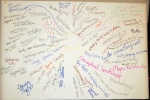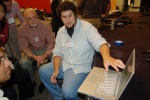After months of preparation, IIW2007 has begun. Whew! I always feel a big relief when the "train leaves the station" as Mike Jones said.
During the introductory presentation Eugene Kim asked how many people were here for the first time and probably one-half two-thirds of the audience stood up. That's great. He also asked how many people had been at the first IIW in Berkeley and there were a dozen or so people in that group.
We're starting off differently this year. We broke the group into smaller groups of 7 or 8 and asked them to discuss the "key questions" they brought to the workshop. The goal was to get people introduced to each other as well as to some of the issues, and maybe even some of the answers--at least the current thinking.
This is the concept map that came from the group discussion. To read it, you'll need to click through to the highest resolution, probably.
Concept
map from introductory session of IIW (click to enlarge) |
I'll be putting my pictures of IIW2007 online as well. Others will be using the iiw2007 tag at Flickr.
Speed Geeking (click to enlarge) |
The middle part of the afternoon is a series of lightening talks from about some of the projects in the user-centric identity area. Dale Olds spoke about OSIS. Eve Maler spoke about Liberty Alliance and SAML. Mike Jones spoke about CardSpace. Mary Ruddy spoke on Higgins. David Recordon and Bill Washburn spoke on OpenID and OpenID Foundation.
Speed
Geeking (click to enlarge) |
After project introductions, we held speed geeking. This is a reprise of an event that debutted at last December's IIW. We moved it to Monday to get people interacting early and to leave time for tomorrow afternoon's OSIS working sessions. Here's a list of the demos:
- Higgins and idemix
- Sxipper
- Vidoop
- CardSpace
- bandit
- OpenID Token Exchange Extension
- Schemat Consumer
- PIBB
- OpenDS
- Community Portal with SAML2, & CardSpace
- Simple Identity for the Web
- WSO2 Identity Solution
The afternoon finished up with the traditional address by Doc. Doc has had a powerful vision of what user-centric identity can achieve, probably going back to the Clue Train days. I love to hear him preach the gospel of user-centric identity.







